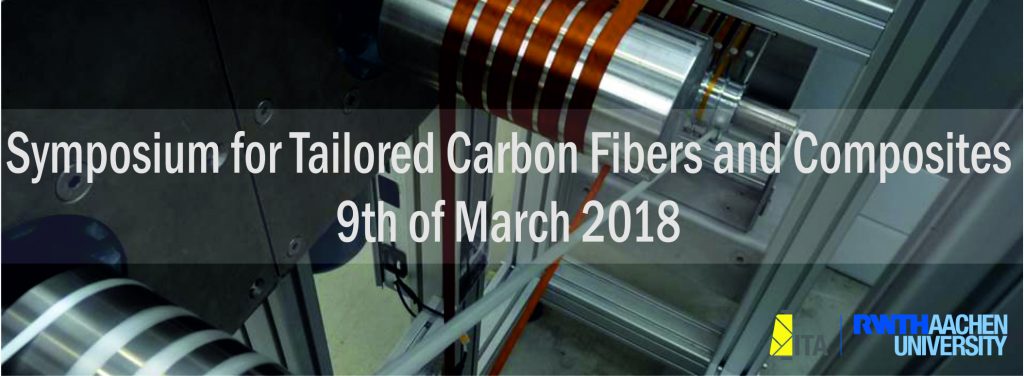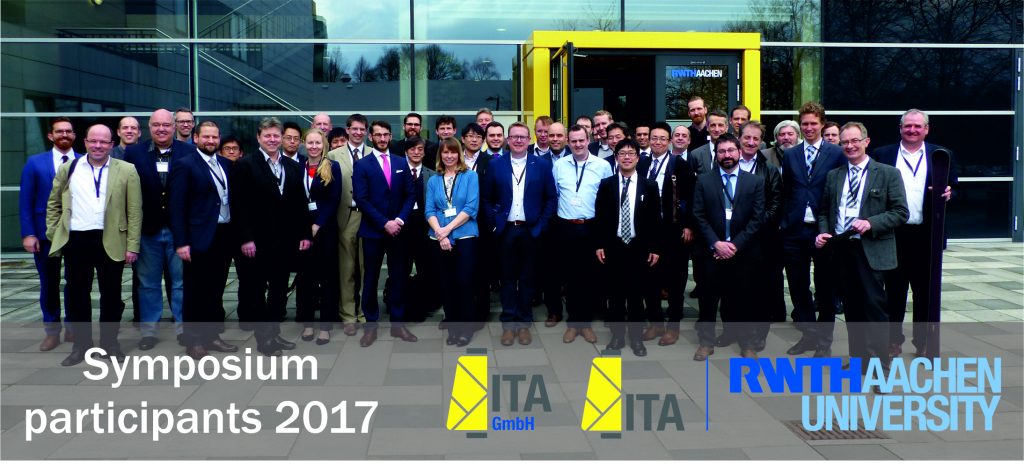Symposium
The need for composite materials for use in high-perfomance lightweight applications has significantly increased recently. At the same time new innovations and advancement of new materials, semi-finished products, utilities, processes and technologies have to be developed. The forthcoming symposium for „Tailored Carbon Fibers and Composites“ 2018 addresses these challenges. It will take place on Friday 9th of March in Aachen.
During the symposium industry partners and companies along the whole process chain from precursor manufacturers, over textile producers to composite manufacturers and final users will share their deficits and requests in processing and development of tailored composites. Inter alia presentations from renowned companies and industry partners will take place. Aim of the symposium is to unite companies along the process chain to face their needs and deficits in processing. Beside lectures and presentations five innovation workshops take place. In these workshops the presentation topics and mentioned deficits will be discussed and needs in research and development will be identified. These topics will then be elaborated to project plans for future research activities.
Available workshops:
Recycled Carbonfibers for building and infrastructure applications
95% of every new car must be recycled since 2015. 60% of all industrial floors contain short fibers. The controversial issue of the reuse of carbon fiber waste that has been generated in the automotive, aviation and construction industries for years is still unresolved. However, recycled carbon fibers (rCF) are considerably cheaper than their originals – and offer almost identical performance. Only the shortening of the fiber length through recycling currently prevents the high performance material from being returned to its original application. Rethink the future of carbon fiber! For decades, short fibers have been used successfully in countless products in large quantities in the construction industry. What today is possible with steel, glass and plastic fibers can be easily surpassed by light-weight, high-strength and especially cost-effective rCF. This is demonstrated by preliminary tests carried out by ITA. Open up new applications for recycled carbon fibers in the construction industry with us: whether industrial flooring, precast concrete or shotcrete, whether short fiber or non-woven – you can put the frame in place thanks to your practical experience.
Yarn spreading and splitting
Reinforcing tapes have become an indispensable material for high-performance fibre-reinforced composites. Its versatility enables the production of tailor-made fibre-reinforced composites (FRP) with load-specific design. In comparison to the use of conventional flat reinforcement textiles, material utilisation during component production can be significantly enhanced. As a result, component costs and component weight can also be considerably reduced. However, there is a large number of different tape materials, machine technologies and process chains as well as unclear requirements along the entire process chain. The workgroup „Tapes and their Composite Applications“ at the Institute of Textile Technology (ITA) of RWTH Aachen University focuses on this topic. The aim of the workgroup is to identify the requirements for tapes from the perspective of the entire process chain and to further develop the tape process chain through a consortium of established industrial partners. For this purpose, specialist presentations are given in the workgroup, key topics are discussed and a cross-process chain network is established. Projects for necessary developments on the material and process side are derived and further future research topics are defined.
Profile and tubular preforming
Profiles and tubular components are one of the most common structures for highly stressed components. Throughout the product development process for such composite components the decision on the actual technology has to be done at a very early stage. The fact that fiber and matrix, two components of mutually exclusive properties have to be combined means both challenge and opportunity. It has to be considered, that the development of a composite – in sense of material evolution – proceeds during manufacturing. Hence choosing the appropriate manufacturing technology plays a crucial part for the preforming of profiles and tubular components. With regard to the quality control, simulation and testing of profiles, many questions and challenges are independent of the production technology. At the institute 2D-and 3D-braiding, single- and multi-filament winding as well as 3D-weaving and preforming processes are used to advance the materials and manufacturing routes for composite profiles. To summarize, decision methods for choosing the appropriate production technology and on the other hand identifying synergy effects e.g. with regard to quality control systems are are essential. The aim is to work on comprehensive concepts, which gives guidance and opportunities for a strategic product development of profile composite components.
Structural health monitoring of composites
Within the last decades, lightweight design with composites such as fiber reinforced plastics (FRP) has evolved to an advanced state, leading to highly optimized structures, often used in safety-relevant applications. The load carrying behaviour of FRP structures can be significantly influenced by fatigue or damage. Hence it is crucial to detect any damages early. In state of the art scenarios, this means performing inspections on a regular basis, causing both costs for the inspection and cost of idleness for the respective component. Structural Health Monitoring (SHM) allows for automatic in-service monitoring of the structural integrity of composite structures and –systems. Thus it can significantly contribute to operational safety while reducing maintenance costs at the same time. Yet, SHM methods are hardly established in composite applications today. The Industrial Research Group on SHM aims on giving an overview on the latest developments regarding, sensors, process implementation and application. The aim is to establish pre-competitive knowledge to establish know-how needed for implementation of SHM in possible FRP-applications.
Quality management of carbon fiber
The data sheet properties of carbon fibers consist of information regarding mechanical tow properties like strength, modulus and elongation. However, these information often are meaningless for a proper CFRP design. Moreover, parameters like Young’s modulus can be influenced up to 40 % by the measurement method, which renders the data sheet properties useless. Furthermore, information like fiber homogeneity (over length and over filaments), spreadability, tribological properties and the processability in e.g. weaving or braiding aren’t considered at all.
In this workshop relevant parameters for carbon fiber processing are identified and analyzed. Carbon fibers of different types and suppliers will be tested on these properties (e.g. Homogenity, spreadability). At the end, a recommendation is made which fiber is best suited for a specific application.
Call for Lectures:
Share your needs in research! We invite authors to submit abstracts for oral presentation at the Symposium for „Tailored Carbon Fibers and Composites“ 2018 in Aachen.
Deadline for abstract submission: February 9th, 2018
Submission via email to andreas.depalmenaer@ita.rwth-aachen.de
Download: Abstract template
Registration and fees:
Download: Registration form
Registration includes:
- Full symposium program and participation in innovation workshops
- Lunch and guided ITA-tour
Payments:
- Payments are secure and processed by ITA Transfertechnology GmbH. Upon receipt of your written application, you will receive by email from the ITA your registration confirmation and an invoice for your fee.„early-bird“ registration fee of 100 € (excl. VAT) will be available till January 26th. As of January 27th registration fee will be 175 € (excl. VAT).The fee includes attendance at all lectures, beverages during breaks, lunch and conference documents. If a registration is cancelled by February 22nd, a fee of 50 € will be charged. After this date, no fees will be refunded. Sending of a substitute is possible.
Cancellation of registration:
-
- Notice of cancellation must be made in writing to the events coordinator at andreas.depalmenaer@ita.rwth-aachen.de
Venue:
-
- Institut für Textiltechnik RWTH Aachen University, Otto-Blumenthal-Straße 1, 52074 Aachen
- Download: Route map
- Download: List of accommodations
Downloads:
- Download: Posters and presentations 2017
For further information please contact the events coordinator at andreas.depalmenaer@ita.rwth-aachen.de



